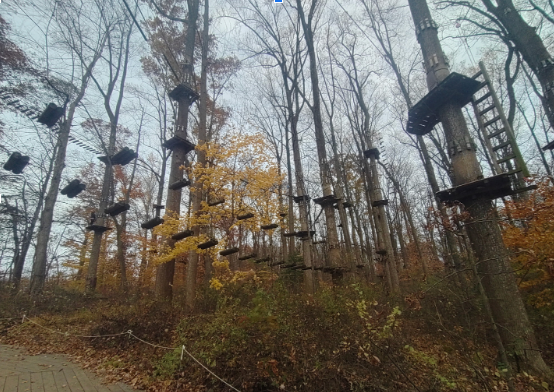“Cinderella Enchanted” and the Making of a Musical
- Sara Weinrod
- Mar 1, 2023
- 3 min read

Senior Wes Greene and freshman Lucy Crino in “Cinderella Enchanted” on Feb. 9 / Credits: Adah Svetlik
The School Without Walls Music and Performing Arts Department recently performed its rendition of “Cinderella Enchanted” at the University of the District of Columbia Theater of the Arts, capping off months of rehearsal and preparation.
The show took place in the evenings of Feb. 9 and 10, along with a matinee performance Thursday morning. “Rodgers & Hammerstein’s Cinderella Enchanted,” the first musical Walls has put on in three years, re-envisions the classic fairytale as a musical in two acts.
Students in the cast, crew, and orchestra spent months preparing for opening night. The time-consuming rehearsals required students to miss large amounts of class time, but proved rewarding when the actors stepped on the stage in front of the Walls community earlier this month.
Drama teacher Lea Zaslavsky, the director of the production, said in the show program that “there were clashes with everyone… teachers, administration, students, costumes, copy machines.” Still, the show went on.
In fact, the performers had two weeks to put the show together. “It was kind of last minute,” freshman Aden Goldberg said. “We found out it was going to be at UDC, but we weren’t sure what day.” Regardless, “it was really great to hear” that it wasn’t going to be in the Commons.
The musical demanded help from the entire school. In addition to the main cast, 30 orchestra students performed the score. Costume dressers, make-up artists, set designers, and a stage crew also spent hours perfecting the sets and costumes.
Ms. Zaslavsky said this teamwork revealed “how dependent we truly are on one another, how we affect one another, how we grow, learn, and thrive with one another.” She added that “after a year and a half of living in COVID pandemic silos, this sense of community was so needed.”
Even those usually uninvolved in the performing arts at Walls pitched in. Desperate for male ballroom dancers, Ms. Zaslavsky gave calculus teacher Kristin Kelly a list of upperclassmen to recruit despite their lack of dancing experience. Ms. Kelly recalled one student saying, “I am a terrible dancer and don’t know how to
dance.” Still, Ms. Kelly recruited so many senior boys to dance that they outnumbered their female partners. The ballroom dance ended up being one of the audience’s favorite scenes, prompting cheers from across the auditorium.
The musical was double-casted, with each cast having performed one night of the show’s two-night run. In total, there were 17 main cast members, along with a chorus, two dance ensembles, and an orchestra.
Sophomore Lexi Padre, who played stepsister Grace in cast B, explained the benefits of a double-casted production. “Sometimes we’ll have rehearsal together where one of us watches the other [actor playing that role] go through the blocking, or vice versa.”
Goldberg, who played stepsister Grace in cast A, said that scheduling is the most
challenging aspect of rehearsal, “because it change[d] week by week.” The fluctuating rehearsals created difficulties for students planning other extracurriculars, as cast and crew had to be available on a week-to-week basis in case the schedule changed.
Junior Patrick Carey, who played Prince Christopher in cast B, said that, “the only bad aspect [of rehearsal was] getting home late.” The production began in October with auditions, when aspiring singers, actors, and dancers performed a memorized monologue and a thirty-second snippet of a song.
In November, rehearsals were held two to three times a week. Cast members familiarized themselves with the script and began learning their lines in a group. Rehearsals intensified in December, with students staying almost every day after school to practice blocking and build sets.
The musical’s production fostered a tight community, which appealed to many students. Padre recounted choreographing the dance with the seniors Ms. Kelly recruited: “I love just all sitting around and working through our choreography or our lines and having fun, laughing when we get something wrong together.”
Goldberg’s favorite memories of rehearsal involve a bit of mischief as well. Goldberg remembers “some underskirts that [they] would try on as hats,” among other “ridiculous things that make the cast special.”







